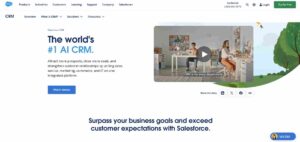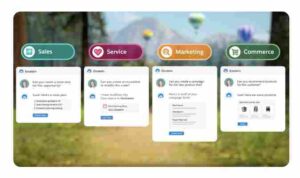Salesforce CRM is a leading customer relationship management platform that serves over 150,000 businesses globally. It supports over 4 million users across various industries, providing robust sales, marketing, and customer service tools. The platform drives productivity with a reported 38% boost in sales, 45% increase in lead conversion, and 35% better customer satisfaction for its users.
- Lead & Opportunity Management: Track customer interactions, manage sales pipelines, and forecast opportunities with AI-powered analytics.
- Einstein AI: Built-in AI delivers predictions and automation to boost productivity and close deals faster.
- Customizable Dashboards: Fully configurable reports and dashboards help monitor KPIs in real time.
- AppExchange Marketplace: Access to over 5,000 third-party integrations and tools.
- Mobile Accessibility: Salesforce’s mobile app lets sales teams manage operations on the go, increasing productivity by 30%.
- Automation Tools: Automate routine tasks with workflows, approvals, and intelligent process automation.
| Pros of Salesforce CRM | Cons of Salesforce CRM |
|---|---|
| ✅ Highly customizable and scalable | ❌ Steep learning curve for new users |
| ✅ Extensive AppExchange integration ecosystem | ❌ Can be costly for small businesses |
| ✅ AI-powered features for smarter sales | ❌ Customization may require advanced skills |
| ✅ Strong mobile app functionality | ❌ Complex setup and implementation process |
| Plan | Features | Price |
|---|---|---|
| Essentials | Basic CRM for up to 10 users, email integration, task tracking | $25/user/month |
| Professional | Advanced sales automation, custom reports, no user limit | $75/user/month |
| Enterprise | Complete CRM with advanced customization and workflow automation | $150/user/month |
| Unlimited | Unlimited CRM power with 24/7 support and exclusive features | $300/user/month |
Who is Salesforce CRM for?
Salesforce CRM is ideal for businesses of all sizes, from small teams needing basic CRM tools to large enterprises requiring advanced customization and scalability. It’s particularly beneficial for sales-driven organizations that want to automate tasks, track leads, and utilize data-driven insights to make better decisions. If you need a CRM that can grow with your business and offers integration options across various software, Salesforce is the go-to solution.
Companies that rely heavily on sales forecasting, pipeline management, and customer analytics will find Salesforce indispensable. It’s also a great fit for industries such as financial services, healthcare, and retail that need specific solutions tailored to their needs through Salesforce’s industry clouds.
How to set up Salesforce CRM?
Setting up Salesforce CRM is a multi-step process but can be streamlined with guided onboarding or expert help. Here’s how to set up the platform:
- Sign Up and Choose a Plan: Visit the Salesforce CRM pricing page and select the plan that aligns with your needs. Salesforce offers a free 30-day trial for users to explore the platform.
- Customize Your Dashboard: Configure the dashboard to align with your company’s workflows, using drag-and-drop functionality to add components like reports, charts, and activity timelines.
- Import Data: Use the Data Import Wizard to upload contacts, accounts, leads, and opportunities. Ensure data is clean and consistent for accurate reporting.
- Configure User Roles and Permissions: Define user roles, access levels, and workflows based on your organizational hierarchy. Set up profiles to control visibility and data access.
- Integrate Third-Party Tools: Leverage the AppExchange to add tools like Slack, Outlook, or MailChimp for a seamless experience.
- Enable Automation: Set up automated workflows, triggers, and alerts to improve productivity. For example, create an automated email response for new leads.
- Training and Onboarding: Use Salesforce’s Trailhead resources and in-app tutorials to onboard your team efficiently.
FAQs
- How long does it take to implement Salesforce CRM? The implementation timeline can vary depending on the size of the organization and customization needs. For smaller teams, setup can take a few weeks. For large enterprises with extensive customization, it can take a few months. On average, expect around 6-12 weeks for implementation.
- Does Salesforce offer a free version? Salesforce doesn’t offer a free version, but there’s a 30-day free trial that allows users to explore most features of the platform. However, after the trial, you’ll need to choose a paid plan.
- What kind of customer support does Salesforce provide? Salesforce offers multiple support levels, ranging from self-service with their Essentials plan to 24/7 premium support with their Unlimited plan. Enterprise and Unlimited plans also include access to a dedicated Success Manager.
- Is Salesforce CRM mobile-friendly? Yes, Salesforce offers a robust mobile app compatible with iOS and Android. The app allows sales teams to access customer data, update records, and track sales progress on the go, which has been shown to improve productivity by 30%.
- Can Salesforce CRM be customized? Absolutely! Salesforce is known for its deep customization capabilities. You can tailor everything from objects and fields to workflows and automation rules. Additionally, developers can create custom applications using Salesforce’s platform.
By combining powerful automation, AI-driven insights, and a customizable framework, Salesforce continues to be the CRM of choice for growing and scaling businesses globally.



